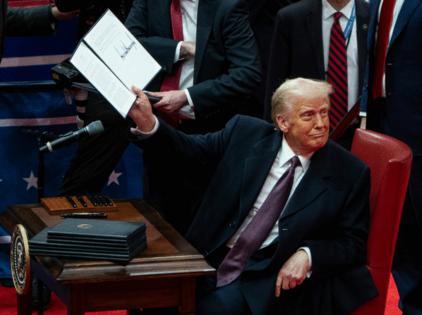Here's what President Donald Trump did on his first day in office
Published in Political News
WASHINGTON — President Donald Trump took swift action Monday to put his stamp on the federal government by quickly signing a spate of executive orders that address his administration’s top priorities and set the stage for other changes to come.
Hours after his swearing-in ceremony at the Capitol Rotunda, Trump issued directives that withdrew the U.S. from the Paris Agreement climate change accord, froze federal hiring and halted nearly 80 of former President Joe Biden’s “disruptive, radical” executive orders.
Trump issued pardons for almost every defendant charged with the ransacking of the U.S. Capitol on Jan. 6, 2021, while federal legislators were certifying Trump’s 2020 election defeat.
And he took steps to reshape the federal bureaucracy by freezing most federal hiring, requiring many staffers to return to full-time in-person work and stopping new rule-making until his administration is in place.
He signed many of the orders from an on-stage desk on stage at Capital One Arena to the roaring approval of a crowd of roughly 20,000 supporters, many of whom had waited more than eight hours for his arrival.
Here’s a closer look at some of his key actions:
PARDONS. Trump issued pardons for all but 14 people charged with storming the U.S. Capitol on Jan. 6, 2021, in an attempt to stop the counting of electoral ballots that formalized Joe Biden’s 2020 victory.
Nearly 1,600 people have been charged in the riot, including 44 people with Georgia ties. While many of those charged faced misdemeanors charges akin to trespassing or demonstrating without permission, others were charged with assaulting police, seditious conspiracy or civil disorder — a felony that involves violently obstructing police or interfering with the functioning of the federal government.
The 14 defendants not issued pardons belong to the extremist groups the Oath Keepers and the Proud Boys. Their sentences were commuted by the order.
ENERGY. For the second time, Trump said he would withdraw the U.S. from the Paris Agreement, the 2015 pact signed by most nations to combat rising temperatures by limiting carbon emissions to avoid the worst impacts of climate change. Trump withdrew the U.S. from the pact during his first term, though it was reversed after Joe Biden took office in 2021. With the move, the U.S. would join Iran, Libya and Yemen as the only countries that refuse to sign the accord.
Trump said he’ll declare a “national energy emergency” to overhaul regulations involving energy production and declared that he would fulfil his pledge to promote more domestic oil drilling. And he vowed to reverse the Biden administration’s green energy incentives, which have helped fuel a boom in Georgia’s growing electric vehicle industry.
IMMIGRATION. After harnessing angst about illegal immigration during his campaign, Trump said during his inaugural address he would declare a national emergency at the U.S. border with Mexico that would allow his administration to deploy the military and National Guard to deter illegal crossings.
It’s one of roughly 10 immigration-related orders that administration officials say he’ll sign as he initiates a mass deportation of people in the country illegally.
And Trump said he would push to revoke birthright citizenship, a constitutional guarantee which allows children born in the U.S. to claim citizenship regardless of the immigrant status of their parents. That is expected to trigger a lengthy legal battle.
GOVERNMENT. One of Trump’s first moves after returning to power echoed an action that he took at the start of his first term in the White House.
He signed an order that suspends most federal hiring, with exceptions for national security, public safety and the military. It follows his pledges to reduce the size of the federal government, which he has waged war on over the last decade.
Another order mandates that federal workers return to offices five days a week, ending work-from-home privileges that proliferated during the COVID-19 pandemic.
Some of the biggest changes to Washington institutions could stem from an order creating a Department of Government Efficiency tasked with slashing government spending. The agency will be helmed by billionaire Elon Musk, who has become a key part of Trump’s inner circle. U.S. Rep. Marjorie Taylor Greene will also play a key role. The Georgia Republican has been named to lead a House subcommittee supporting the work of the agency.
JIMMY CARTER: Before he even had lunch, Trump signed a proclamation ordering that flags be at flown at full-staff Monday and on all future presidential inauguration days.
Flags across the country have been flown at half-staff to mourn the death on Dec. 29 of former President Jimmy Carter, of Georgia. The flags were supposed to stay down for 30 days, or until Jan. 28. Flags will return to half-staff on Tuesday, under Trump’s directive.
Trump has complained about the flags being at half-staff during his inauguration.
The Republican attended Carter’s Jan. 9 funeral at Washington National Cathedral, along with the four other living former presidents. But he has also pledged to roll back some of Carter’s signature accomplishments such as environmental protections and ceding control of the Panama Canal.
©2025 The Atlanta Journal-Constitution. Visit at ajc.com. Distributed by Tribune Content Agency, LLC.




























































Comments